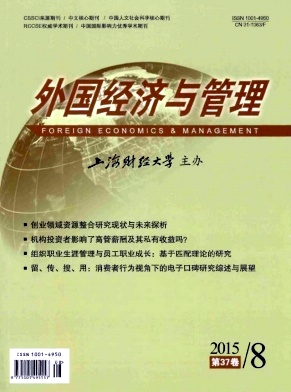机构投资者影响了高管薪酬及其私有收益吗?——基于不同特质机构投资者的研究
外国经济与管理 2015 年 第 37 卷第 08 期, 页码:
摘要
参考文献
摘要
关于机构投资者在公司治理中是否具有积极作用,一直存在分歧和争议。本文基于薪酬契约设计理论,探讨了机构投资者特质对高管薪酬及其私有收益的影响,以探究不同特质的机构投资者在公司治理中扮演的角色,据此深入分析股东监督机制和经理激励机制之间的相互关系。研究发现,从机构投资者的独立性特质来看,独立机构投资者不仅能加强薪酬—业绩敏感性,而且可以大大降低高管的货币型和非货币型私有收益,这揭示出股东监督机制和管理者激励机制的互补关系;同时,从机构投资者持股期限来看,长期机构投资者能够显著降低高管的货币型和非货币型私有收益,但是不能显著提高薪酬—盈余业绩敏感性,这意味着股东监督机制和管理者激励机制之间呈现出替代关系。研究结论表明,不同的公司治理机制之间并不是孤立起作用的,而是相互影响的,既可能互相补充,也可能互相替代。
[1]Almazan A,et al.Active institutional shareholders and costs of monitoring: Evidence from executive compensation[J].Financial Management,2005,(4): 5-34.
[2]Bebchuk L A,et al.Managerial power and rent extraction in the design of executive compensation[J].University of Chicago Law Review,2002,69(7): 751-846.
[3]Bolton P,et al.Executive compensation and shorttermist behavior in speculative markets[J].Review of Economic Studies,2006,73(3): 577-610.
[4]Bushee B J.The influence of institutional investors on myopic R&D investment behavior[J].The Accounting Review,1998,73(3): 305-333.
[5]Chen X,et al.Monitoring: Which institutions matter?[J].Journal of Financial Economics,2007,86(2): 279-305.
[6]Cheng C S A,et al.Institutional monitoring through shareholder litigation[J].Journal of Financial Economics,2010,95(3): 356-383.
[7]Coles J,et al.Managerial incentives and risktaking[J].Journal of Financial Economics,2006,79(2): 431-468.
[8]Core J E,et al.Corporate governance,chief executive officer compensation,and firm performance[J].Journal of Financial Economics,1999,51(3): 371-406.
[9]Cornett M M,et al.The impact of institutional ownership on corporate operating performance[J].Journal of Banking and Finance,2007,31:1771-1794.
[10]Del Guercio D,et al.Do boards pay attention when institutional investor activists “just vote no”?[J].Journal of Financial Economics,2008,90(1): 84-103.
[11]Dikolli S S,et al.Transient institutional ownership and CEO contracting[J].The Accounting Review,2009,84(3): 737-770.
[12]Ferreira M A and Matos P.The colors of investors’ money: The role of institutional investors around the world[J].Journal of Financial Economics,2008,88(3): 499-533.
[13]Gaspar J M,et al.Shareholder investment horizons and the market for corporate control[J].Journal of Financial Economics,2005,76(1): 135-165.
[14]Hartzell J C and Starks L T.Institutional investors and executive compensation[J].The Journal of Finance,2003,(6): 2351-2374.
[15]Jensen M and Murphy K.Performance compensation and top management incentives[J].Journal of Political Economy,1990,98(2): 225-264.
[16]Jackson S B,et al.Accounting fundamental and CEO bonus compensation[J].Journal of Accounting and Public Policy,2008,27(5): 374-393.
[17]Ke B and Petroni K.How informed are actively trading institutional investors? Evidence from their trading behavior before a break in a string of consecutive earnings increases[J].Journal of Accounting Research,2004,42(5): 895-927.
[18]RuizMallorqui M V and SantanaMartin D J.Dominant institutional owners and firm value[J].Journal of Banking and Finance,2011,35(1): 118-129.
[19]Shin J Y.Institutional investment horizons and CEO compensation[R].Working Paper,University of Illinois,2008.
[20]Shin J Y and Seo J.Less pay and more sensitivity? Institutional investor heterogeneity and CEO pay[J].Journal of Management,2011,37(6): 1719-1746.
[21]陈冬华,陈信元,万华林.国有企业中的薪酬管制与在职消费[J].经济研究,2005,(3):92-101.
[22]陈信元等.地区差异、薪酬管制与高管腐败[J].管理世界,2009,(11):130-143.
[23]方军雄.我国上市公司高管的薪酬存在粘性吗?[J].经济研究,2009,(3):110-124.
[24]李善民,王彩萍.机构持股与上市公司高级管理层薪酬关系实证研究[J].管理评论,2007,(1):41-48.
[25]刘凤委,孙铮,李增泉.政府干预、行业竞争与薪酬契约[J].管理世界,2007,(9):76-84.
[26]毛磊,王宗军,王玲玲.机构投资者与高管薪酬——中国上市公司研究[J].管理科学,2011,24(5):99-110.
[27]权小锋,吴世农,文芳.管理层权力、私有收益与薪酬操纵[J].经济研究,2010,(11):73-87.
[28]吴先聪,刘星.机构投资者异质性与公司业绩[J].中国会计与财务研究,2012,14(3):1-55.
[29]辛清泉,林斌,王彦超.政府控制、经理薪酬与资本投资[J].经济研究,2007,(8):110-122.
[30]辛清泉,谭伟强.市场化改革、企业业绩与国有企业经理薪酬[J].经济研究,2009,(11):68-81.
[31]张敏,姜付秀.机构投资者、企业产权与薪酬契约[J].世界经济,2010,(8):43-58.
[2]Bebchuk L A,et al.Managerial power and rent extraction in the design of executive compensation[J].University of Chicago Law Review,2002,69(7): 751-846.
[3]Bolton P,et al.Executive compensation and shorttermist behavior in speculative markets[J].Review of Economic Studies,2006,73(3): 577-610.
[4]Bushee B J.The influence of institutional investors on myopic R&D investment behavior[J].The Accounting Review,1998,73(3): 305-333.
[5]Chen X,et al.Monitoring: Which institutions matter?[J].Journal of Financial Economics,2007,86(2): 279-305.
[6]Cheng C S A,et al.Institutional monitoring through shareholder litigation[J].Journal of Financial Economics,2010,95(3): 356-383.
[7]Coles J,et al.Managerial incentives and risktaking[J].Journal of Financial Economics,2006,79(2): 431-468.
[8]Core J E,et al.Corporate governance,chief executive officer compensation,and firm performance[J].Journal of Financial Economics,1999,51(3): 371-406.
[9]Cornett M M,et al.The impact of institutional ownership on corporate operating performance[J].Journal of Banking and Finance,2007,31:1771-1794.
[10]Del Guercio D,et al.Do boards pay attention when institutional investor activists “just vote no”?[J].Journal of Financial Economics,2008,90(1): 84-103.
[11]Dikolli S S,et al.Transient institutional ownership and CEO contracting[J].The Accounting Review,2009,84(3): 737-770.
[12]Ferreira M A and Matos P.The colors of investors’ money: The role of institutional investors around the world[J].Journal of Financial Economics,2008,88(3): 499-533.
[13]Gaspar J M,et al.Shareholder investment horizons and the market for corporate control[J].Journal of Financial Economics,2005,76(1): 135-165.
[14]Hartzell J C and Starks L T.Institutional investors and executive compensation[J].The Journal of Finance,2003,(6): 2351-2374.
[15]Jensen M and Murphy K.Performance compensation and top management incentives[J].Journal of Political Economy,1990,98(2): 225-264.
[16]Jackson S B,et al.Accounting fundamental and CEO bonus compensation[J].Journal of Accounting and Public Policy,2008,27(5): 374-393.
[17]Ke B and Petroni K.How informed are actively trading institutional investors? Evidence from their trading behavior before a break in a string of consecutive earnings increases[J].Journal of Accounting Research,2004,42(5): 895-927.
[18]RuizMallorqui M V and SantanaMartin D J.Dominant institutional owners and firm value[J].Journal of Banking and Finance,2011,35(1): 118-129.
[19]Shin J Y.Institutional investment horizons and CEO compensation[R].Working Paper,University of Illinois,2008.
[20]Shin J Y and Seo J.Less pay and more sensitivity? Institutional investor heterogeneity and CEO pay[J].Journal of Management,2011,37(6): 1719-1746.
[21]陈冬华,陈信元,万华林.国有企业中的薪酬管制与在职消费[J].经济研究,2005,(3):92-101.
[22]陈信元等.地区差异、薪酬管制与高管腐败[J].管理世界,2009,(11):130-143.
[23]方军雄.我国上市公司高管的薪酬存在粘性吗?[J].经济研究,2009,(3):110-124.
[24]李善民,王彩萍.机构持股与上市公司高级管理层薪酬关系实证研究[J].管理评论,2007,(1):41-48.
[25]刘凤委,孙铮,李增泉.政府干预、行业竞争与薪酬契约[J].管理世界,2007,(9):76-84.
[26]毛磊,王宗军,王玲玲.机构投资者与高管薪酬——中国上市公司研究[J].管理科学,2011,24(5):99-110.
[27]权小锋,吴世农,文芳.管理层权力、私有收益与薪酬操纵[J].经济研究,2010,(11):73-87.
[28]吴先聪,刘星.机构投资者异质性与公司业绩[J].中国会计与财务研究,2012,14(3):1-55.
[29]辛清泉,林斌,王彦超.政府控制、经理薪酬与资本投资[J].经济研究,2007,(8):110-122.
[30]辛清泉,谭伟强.市场化改革、企业业绩与国有企业经理薪酬[J].经济研究,2009,(11):68-81.
[31]张敏,姜付秀.机构投资者、企业产权与薪酬契约[J].世界经济,2010,(8):43-58.
引用本文
吴先聪. 机构投资者影响了高管薪酬及其私有收益吗?——基于不同特质机构投资者的研究[J]. 外国经济与管理, 2015, 37(8): 0.
导出参考文献,格式为:





 6727
6727  0
0

